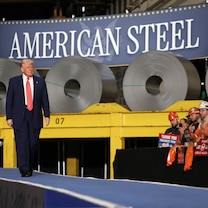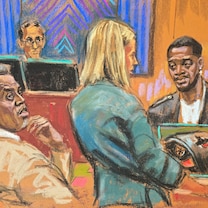Court Rules for White and Hispanic Firefighters, Reversing Sotomayor Decision
Splitting down ideological lines, justices reverse Sonia Sotomayor ruling.
June 29, 2009 — -- In a decision that could have sweeping impact on employers across the nation, the Supreme Court ruled today that white and Hispanic firefighters in New Haven, Conn., were unfairly denied promotions because of their race, reversing a decision that Supreme Court nominee Sonia Sotomayor endorsed as an appeals court judge.
Splitting down ideological lines, the court ruled 5-4 that New Haven violated a landmark civil rights law when the city threw out the results of a promotions exam after it was determined that none of the black firefighters who took the test scored well enough to be promoted.
The court's decision will make it harder for employees to sue if they believe employers have made decisions that have a discriminatory impact on them, but are in other respects race-neutral and fair on their face -- as the Court said these promotions exams were.
"I think the import of the decision is that cities cannot bow to politics and pressure and lobbying by special interest groups, or act to achieve racial quotas," said Karen Torre, the attorney for the firefighters. "If the test is job-related, especially in a dangerous occupation, then the fact that more African Americans pass, or more Hispanics pass, or more whites pass, isn't sufficient grounds to ignore the results of an occupational test."
The case took on an extra layer of significance when President Obama nominated Sotomayor to fill the upcoming vacancy on the Supreme Court. Sotomayor, currently a federal appeals judge, sat on a panel that dismissed the white firefighters' claims -- and 2,000 pages of court papers in filings -- in a one-paragraph ruling.
But Sotomayor's defenders quickly pointed out that the court's four liberals did not agree. They argued that the court is reshaping civil rights law with today's ruling, something Sotomayor could not have done as an appeals court judge. However, those arguments were somewhat diminished, since it appears even the liberal justices would have sent the case back to the lower court and ordered a rethinking of its summary decision.
Congress could now step in and change the civil rights laws and overrule this decision, but it would be a politically difficult endeavor because the white firefighters gained a bit of sympathy for their reverse discrimination claims.
Justice Anthony Kennedy, writing for the majority, said New Haven had violated the landmark Title VII Civil Rights Act of 1991. The city had no good reason to throw out the test results, he said, even if it was threatened by lawsuits by the black firefighters. It's decision to do so, he wrote, amounted to a "de facto quota system," where it was making decisions based on "raw racial statistics."
"We conclude that race-based action like the City's in this case is impermissible under Title VII unless the employer can demonstrate a strong basis in evidence that, had it not take the action, it would have been liable under the disparate-impact statute," Kennedy wrote. "In light of our ruling under the statutes, we need not reach the question whether respondents' actions may have violated the Equal Protection Clause."
Justice Ruth Bader Ginsburg read an impassioned dissent from the bench, in which she chastised the Court for a decision that she said will do "untold" damage to civil rights laws.
"This case presents an unfortunate situation, one New Haven might well have avoided had it used a better selection process in the first place," she wrote. "But what this case does not present is race-based discrimination in violation of Title VII. Congress endeavored to promote equal opportunity in fact, and not simply in form. The damage today's decision does to that objective is untold."
On the steps of New Haven's city hall this afternoon, firefighter Frank Ricci told reporters he was "overwhelmed" by the high court's decision that took nearly six years to come.
"This ruling is a vindication for all New Haven 20 and the rest of the country," said Ricci. "We thought the law was pretty clear, we thought the facts and the evidence was clear … We're very pleased that the court agreed with us."
Matthew Marcarelli, who had qualified as captain before the test results were thrown out, said the "truest vindication" will be the day he and the other 19 white and Hispanic firefighters get the captain and lieutenant badges they deserve.
"The truest vindication is the day that we all get pinned our badges on ... It was worth it. Every minute of it. Right guys?" said Marcarelli to boisterous applause and cheers.
New Haven Mayor John DeStefano Jr., who was a key supporter of scrapping the test results, reacted to the ruling in a press conference today.
"The Supreme Court is not bound by precedent in its interpretations of anti-discrimination law and have for some time been showing increasing distance from reasonable and time tested efforts in the pursuit of remedying discrimination," said the mayor. "That said, we here clearly have the obligation to follow it and we will."
Reaction on the Hill
While the firefighters were rejoiced by this morning's ruling, a chorus of voices in Washington began to rumble.
In a particularly strongly worded written statement, Republican leader Sen. Mitch McConnell of Kentucky said the Supreme Court decision, contrasted with Sotomayor's ruling of the case on the lower court, underscored his "concern that she may have allowed her personal or political agenda to cloud her judgment and affect her ruling."
Sen. Patrick Leahy, D-Vt., the chairman of the Senate Judiciary Committee, said in a statement that today's decision interprets Title VII in a way "never intended by Congress" and could have a negative impact on protections for families.
"Today's narrow decision is likely to result in cutbacks on important protections for American families," Leahy said. "It is less likely now that employers will conscientiously try to fulfill their obligations under this time-honored civil rights law. This is a cramped decision that threatens to erode these protections and to harm the efforts of state and local governments that want to build the most qualified workforces."
Republican Sen. Orin Hatch of Utah, a member and former chairman of the Senate Judiciary Committee, agreed with the high court's decision and made sure to point out Sotomayor's involvement in the initial ruling.
"The Supreme Court today correctly held that race-based employment decisions must be justified by facts, not fear," Hatch said in a written statement. "These firefighters, who worked long and hard for it, were denied the chance for promotion because of their race. In the 21st century, race discrimination requires more justification than the fear of being sued. The Second Circuit should have recognized the serious and unique issues this case raised and given it the thorough treatment it deserved."
When firefighters battle a raging blaze, they can be sure that at least one thing will treat them all equally.
As Connecticut firefighter Ben Vargas said before the ruling, "The fire isn't going to discriminate against a person whether he's black, white or Hispanic... It's going to treat that person the same way."
But in New Haven, Vargas, who is Hispanic, and 19 white firefighters said that is where the equal treatment ends, and discrimination begins. They had alleged that they were denied promotions because the city gave preferential treatment to blacks.
Marcarelli, who is white, got the top score on a promotion exam in 2003 and was first in line for captain. But when the city reviewed all the test results, it found that the pass rate for black candidates was about half the corresponding rate for white candidates. None of the black firefighters scored well enough for an immediate promotion. As a result, the city threw out the test results.
In New Haven, city officials knew they were headed for a catch 22 when the test results came back. If the city certified the test results, it was confident it could expect a lawsuit from the black firefighters. But when it threw out the test results, it instead got a lawsuit from mostly white firefighters.
Blacks make up about a third of New Haven's 221 firefighters, 15 percent are officers -- eight of 42 lieutenants and one of 18 captains.
The case made it all the way to the U.S. Supreme Court, which heard arguments in April. The decision could affect the hiring and promotion practices for millions of civil servants.
The New Haven case is Chief Justice John G. Roberts' first look at the use of race in civil servant hiring and promotion.
For decades, people of color across the country have filed scores of discrimination lawsuits to challenge testing in fire departments, police departments and public schools.





